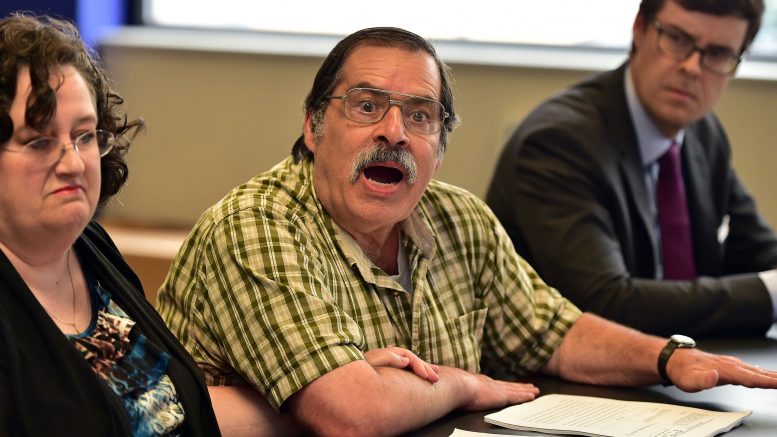Charles Araujo, center, talks about the perceived injustice he and his wife, Evelyn, left, believe to be in the charter school system Thursday. (Photo: Justin Sellers/The Clarion-Ledger)
Flanked by her friend Monica Cannon-Butler, Midtown resident Shmea Kelly stood outside of the Southern Poverty Law Center’s downtown Jackson office Wednesday watching as parents and children shouted from a school bus, “we want choice.”
The group of roughly 45 parents, teachers and administrators from ReImagine Prep and Midtown Public, both charter schools in Jackson, had just wrapped up a rally against the legal non-profit, which had filed a lawsuit declaring the funding of the state’s charter schools an unconstitutional process that presents a “financial cataclysm” for the state’s public school districts. After picking up demonstrators, the bus had made one final loop, a departing reminder to let the SPLC know where things stand.
A soft-spoken mother, Kelly, attended the protest in support of Midtown Public, in which she hopes to enroll her son. Right now, he’s on the waiting list. Dissatisfied, after watching six of her other children matriculate through the Jackson Public School system, she’s determined to enroll him in private school, if he’s not admitted in the fall. Her other children are either in elementary or high school (Midtown serves fifth and sixth grades) and do not qualify — but if she can do better for this one, she said, she will.
To Kelly, Midtown offers better options.
Smaller classrooms, a better handle on behavioral issues. Because the school is located in the artistic enclave of the Capital City, students have the opportunity to get a hands-on experience with creativity outside of the classroom.
“They actually get a chance to go out into the community,” Kelly said.
Having that option would likely appeal to Cassandra Overton-Welchlin, a plaintiff in the SPLC’s lawsuit.
Her 8-year-old daughter, referred to as Z.B.W. in the suit, was diagnosed with Global Childhood Apraxia of Speech and learns best through art.
“She’s incredible,” Overton-Welchlin told The Clarion-Ledger by phone. “She’s very determined but she learns differently. She has an incredible passion for the arts that stimulates her.”
But her daughter’s school, Johnson Elementary, has struggled recently, she said, to employ an art teacher on a consistent basis.
Lack of resources, she posited is the culprit.
When 500 families made the decision to enroll their children in Midtown or ReImagine Prep, $1.85 million of JPS-dedicated property taxes went with them.
According to the suit, that money could have gone toward hiring 42 teachers, 18 new school buses, guidance counselors or vocational education programming.
With new schools set to open this fall, the complaint projected the district stands to lose $4 million.
Overton-Welchin, who is also president of the PTA, has found herself volunteering and organizing arts and crafts in her daughter’s classroom to meet her and her classmates’ needs.
Interviews by The Clarion-Ledger conducted with stakeholders in the lawsuit reveal that both sides believe that the state’s public schools are underfunded and are frustrated with the question of how to adequately educate children in a state where disparities in education seem to fall along the lines of one’s zip code.
As the director for the Mississippi office of the SPLC, Jody Owens said he has seen the long-term ramifications of districts struggling with inadequate resources.
Youth he’s talked with in the past at the Henley-Young Juvenile Justice Center have told him how their troubles often traced back to resource-strapped classrooms.
With more than 30 students in a class and teachers they felt never cared, the pipeline to prison almost became an inevitability for them.
Add that to the crumbling infrastructure and the need for updated textbooks (some of which Owens said predate the election of President Barack Obama).
JPS he argued, Mississippi schools period, can’t afford to financially bleed anymore.
Which makes the Mississippi Charter School Act of 2013, which the complaint said siphons away funds from public schools a “miscarriage of justice.”
At question, before a Hinds County Chancery Court Judge will be whether the two funding provisions of the Act are constitutional.
Will Bardwell, who is serving as counsel for the lawsuit, said Section 208 of the Mississippi Constitution forbids the Legislature from providing funds to schools that are not “free schools.” According to the complaint, in order for schools to be considered “free schools” they must be under the dual regulatory authority of state superintendent and local superintendent. Charter schools, which are exempt from both, but still receive appropriations from the Legislature, are not and therefore, the SPLC argued, a violation.
“You can not build a lifeboat for 500 students out of the hull of a ship that’s carrying 28,000,” said Bardwell. “That is immoral and more importantly, that is unconstitutional.”
He pointed to the Mississippi Supreme Court’s decision in Pascagoula v. Tucker, where it was decided that the district could not be mandated to send oil money from the Chevron crude oil refinery to outside districts, as setting precedent for the local revenue funding for charter schools as being illegal.
Mississippi College School of Law Professor Matt Steffey also referenced the ruling as a sign that the Mississippi Supreme Court may agree that the diversion of local funds is unconstitutional.
The court he said, however, would likely be more reluctant to strike down the portion of the law concerning state funding.
Such a ruling, Steffey said, would sound the death knell for charter schools.
“It’s a very tall order to shut that whole process down, especially based on the vague phrase “free school.”
The lawyers with the SPLC will argue that’s not their point anyway.
“We don’t want the charter schools act struck down,” said Bardwell. “This lawsuit is about the constitution. If the Legislature can find a way to comply with the constitution and keep them open, we would applaud them.”
The simplest way to do such, he said, would be to bring charter schools under the authority of the state and local school board. Another option would be to change the state’s constitution or find another source of funding.
When the Washington State Supreme Court found in a similar lawsuit that charter schools were ineligible for state tax money, the state Legislature instead elected to operate a lottery to keep them open.
Owens said another solution might be to do what other states such as Utah have discussed and provide supplemental funding to replace the dollars of students in charter schools.
Reiterating that the SPLC has no stance for or against charter schools, he added that they elected not to take certain actions such as seeking an injunction or asking for the act to be struck down in its entirety, as a show of good faith.
If the ruling goes in their favor, they want time allotted for the Legislature to make changes during the 2017 session.
“We want to remedy this in a way that is least destructive for students that are in charters,” he said.
Ravi Gupta, chief executive officer of the Nashville-based Republic Schools which opened ReImagine Prep in Jackson, disputed that stance.
“The idea that there’s some disinterested actor here is totally bogus,” he said.
Gupta referred to the lawsuit as a strategy to “drive a wedge between us and JPS.”
All, he argued, are worse for it.
“The real tragedy is we have people leaving the system and collectively the tide is lowering for everybody.”
Evelyn S. Garner Araujo, who along with her husband Charles, is a plaintiff in the lawsuit told The Clarion-Ledger she is tired of seeing people leave too.
“This (lawsuit) is about the children who live up the street from us,” she said.
With her arm laced through her husband’s she described watching neighbors move from the city or pull their children out to attend private schools.
Both told The Clarion-Ledger that the Legislature has a duty to fund schools in a legal manner. Filing the lawsuit was the best way they knew to hold them accountable.
The parents of three boys who have attended JPS schools, the Araujos spoke proudly of their accomplishments — becoming Duke Tip scholars, founding a swim team at Murrah high school (believed to be the district’s first) and their desire for other children in the district to have the same access to resources, such as those in APAC programs, that have enhanced their sons’ learning.
“I want other kids to have the same things my kids have,” said Charles. “I see this as a vehicle to help them do that.”
“If there are good things in charter schools, I hope those good things happen in JPS too,” she said. “I go to church with some of the children that go to charter schools. I want all the children in JPS to have the best future they can have.”
Contact Bracey Harris at bharris2@gannett.com or 601-961-7248. Follow @braceyharris on Twitter.
Source: www.clarionledger.com




